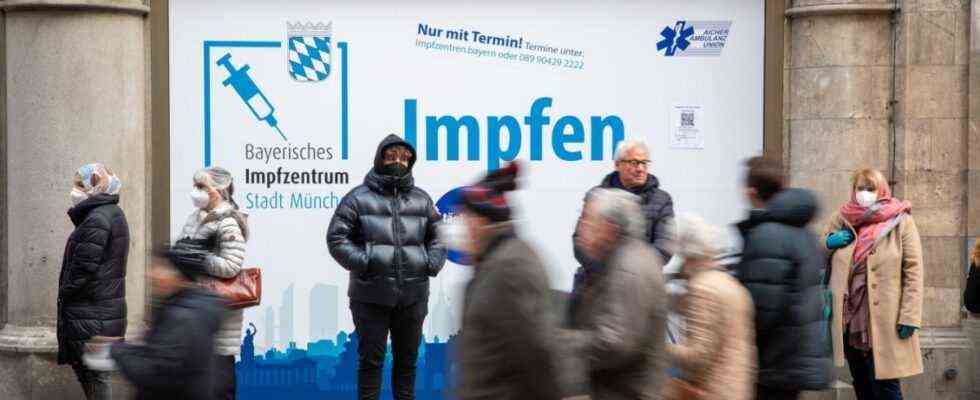The Munich city council can of course not decide on the introduction of a general vaccination requirement, but the local politicians still want to send a signal to Berlin. It is important to position yourself as a body of the largest municipality in Germany, as there was broad agreement on Wednesday. And so, after an extensive debate, the majority of the city council voted in favor of such an obligation. The AfD, the FDP / Bayernpartei and parts of the ÖDP voted against this.
Before the regulation is introduced, however, all other measures to combat the corona pandemic should be exhausted. A corresponding amendment by the SPD / Volt and Greens / Pink List parliamentary groups was also adopted by a majority. The CSU had demanded that the mayor should work to ensure that the vaccination is compulsory as soon as possible. However, it did not find a majority.
In his 20 years as a doctor he had “never experienced such an extent of triage as now in the intensive care units”
The CSU parliamentary group vice-chairman Hans Theiss described the current situation in the intensive care units in an impressive manner. What has been going on there for a few weeks is “actually a humanitarian catastrophe”. In his 20 years as a doctor, he has “never experienced such an extent of triage as it is now in the intensive care units”. He said he could not have imagined “that something like this is possible in our country”. In order to weaken a possible fifth and sixth wave, the compulsory vaccination must therefore be initiated now. You can always start an advertising campaign, but his fear is that the vaccination rate will not go above the critical mark of 85 percent.
Theiss admitted that there were serious reasons against compulsory vaccination, as did members of all other parliamentary groups. For Jörg Hoffmann, parliamentary group leader of the FDP / Bayernpartei, these arguments retained the upper hand in the weighing up. He is an “absolute vaccination advocate” and is convinced that the vaccination saved him from a serious course of his corona infection. He is against the vaccination requirement anyway, for him personal freedom is in the foreground.
For a year and a half, politicians have also “repeated mantra-like” that there will be no compulsory vaccination. Now society is deeply divided. A change of direction, so Hoffmann’s fear, would further divide and promote a loss of confidence in democracy. It is important that politicians adapt to the current situation, countered Stefan Jagel, parliamentary group leader of the Left / Party; that is part of the democratic process. He too was initially against compulsory vaccination, but changed his mind.
The solidarity of the vaccinated will be put to the test
Klaus Peter Rupp, health policy spokesman for SPD / Volt, reported on an intense debate in the parliamentary group. It is an “incredibly difficult question”. It is now proposed that the city council approve the introduction of mandatory vaccination when all measures to combat the pandemic have been exhausted. Florian Roth, leader of the Green / Pink List, said there was already a compulsory vaccination, a moral and ethical one. The division in society consists primarily in the fact that “the solidarity of those who have been vaccinated is being put to the test”. One must continue to promote the vaccination convincingly, but he believes that the point will soon be reached that the measures are no longer sufficient.
There is still a lot that can be done to reach the 25 to 30 percent unvaccinated population, said the leader of the SPD / Volt parliamentary group, Anne Huebner. Everyone has to address this, “but not from above”, but always “as the recipient can take it in”. She praised the fact that the health department also thought about special, low-threshold offers for unvaccinated people in its submission on the subject.
In principle, the AfD wanted to discuss the effectiveness of the vaccination. She did not understand anything, attested her mayor Reiter (SPD). “Nobody here in this room fundamentally denies the effectiveness of the vaccination.” Only “a few confused ideologues or demagogues” would do that. Reiter later renewed his statement that he was “not a fan of compulsory vaccinations”. However, with the amendment to the regulation as a last resort, he supports the positioning. In his speech, he clearly criticized the old as well as the new federal government. Communication in the pandemic was “mediocre right from the start” and there was “still a clear need for improvement”.
He was not enthusiastic about the statements of his party friend Karl Lauterbach, who, as the new health minister, called for mandatory vaccination and at the same time warned that there was not enough vaccine available. The fact that the vaccine doses may not even be sufficient for the booster campaign is “somehow a cognitive contradiction”.
There was too much confusion about the start of child vaccinations
Health officer Beatrix Zurek (SPD) explained why her authority advocates compulsory vaccination. Above all, she would now like the federal level to take vaccine deliveries more seriously – and that dates are only mentioned if they can be met. Zurek cited child vaccination as an example, the start of which had caused some confusion: In the end, the city “had to explain to people why we are not reliable”. She would be happy “if we weren’t the Western Wall” because communication at the federal level works well.

